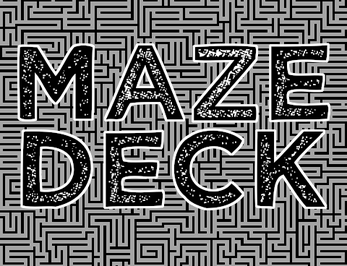
Maze Deck - Labyrinth Crawling Supplement for Maze Rats and other OSR Games.
A downloadable project
What is the Maze Deck?
A few years ago I found myself planning a scenario in a maze and wanted to simulate the feeling of navigating narrow corridors and getting lost in twisting passages. I could give the players a map but they would easily follow the trail to the goal. I could try to describe every twist and turn but that would be a mapping nightmare and quickly turn into a slog. I settled on the Maze Deck after recalling the card game Concentration.
A deck of cards are laid out in rows face down on the table. Each player takes a turn flipping over cards to find matching pairs. Don’t make a match? Put them back face down and try to remember what they were for your next turn. Continue until all the pairs are matched. This method ticked the boxes I needed.
- Matching pairs would represent successful progress along the correct path towards the centre or end of the maze.
- Failures to match represent a wrong turn or getting lost.
- Allowing for setbacks to cause some already matched pairs to be shuffled back onto the table face down let maze like confusion come naturally.
- Players -not their characters- had to stay focused on the task at hand to succeed which kept the table engaged.
- If the players had abilities, magic items, or clever plans to help navigate the maze it was easy to reward that line of thinking.
- Matching face cards easily replaced random encounters, wandering monsters, and finding secrets.
- The method seemed simple, yet ended up being a surprising challenge once I threw in a few RPG style mechanics and populated my maze with monsters, treasures, and traps.
Isn’t this just a mini game?
Probably! I wrote up these rules because I wanted a set piece for a specific encounter. I would not use the rules all the time but they proved to be a nice way to change up the session from our usual play style. Mini-games or special procedures can be fun additions to your campaign, especially when used sparingly so that they don’t take away from the main action of the game. The more I think about it though, the maze deck is less of a mini game and more a style of dungeon procedure for a specific style of environment.
Getting players to buy in
Tell your players ahead of time that you have something a little different planned for this session, or save a game like this for a one shot, or for when some players can’t make it and you just need a quick side quest. Bonus points, because there is no map you can prep a maze with little more than a theme, some good descriptive key words, a hook, and some monsters/treasures/secrets.
This supplement was released as a part of the OSR supplement jam 2022!
Change log for v1.1
- Clarified why players are not allowed to help each other when it is not their turn.
- Clarified the language for Setbacks.
- Changed the function of Landmarks (They now negate Setbacks).
- Clarified the language for Shortcuts.
| Status | Released |
| Category | Other |
| Rating | Rated 4.8 out of 5 stars (10 total ratings) |
| Author | Chaotic Goods |
| Tags | mazerats, OSR, osrsupplementjam, Tabletop role-playing game |

Comments
Log in with itch.io to leave a comment.
Tried this out last night and loved it! I used the 5e tarokka deck and had each high deck card trigger a specific encounter, event, landmark, etc. themed on the card. When I do this again, I'll also add themed fluff for each suit, and completing a suit will reveal a major area based on that theme. That way players could actively pursue matches in that suit if they like the clues they've discovered. All in all, I love this simple supplement and wish I found it sooner! Thank you!
That's awesome! I am so glad you liked it and found it useful.
"Shortcuts." I think you should mention during "Navigating The Maze" that players are supposed not to help each other, else the advantage of "Shortcuts" is superfluous. But: I feel forcing a party of adventurers not to collaborate is a poor idea -- maybe a shortcut could do something else, like let the next player flip over more than two cards?
That actually is mentioned during the Navigating the Maze section, but I will clarify the language so the two sections match.
I also feel that forcing them not to collaborate is not the greatest feeling. In practice though I found that the game was far to easy when all the players could just work together and it undercut the spirit of the mini-game. Maybe I will add something that chalks this rule up to how hard it can be to describe directions to someone else in real life (That's always been my experience).
Thanks for the feedback!
Could you explain the "Landmarks" mechanic? It seems to do nothing if revealed cards are removed from the table, since players don't interact with revealed cards anyways, and it doesn't change the "once a full suit is revealed" mechanic since the face-down cards in that suit remain on the table.
Good catch. I guess the idea is that if there are no revealed cards and you hit a landmark, the landmark is wasted. I have another idea (A landmark prevents a setback from happening). I will update it with that instead.
Thanks again!